
Here's the REAL reason the US Dollar is shrinking... and will continue to shrink!
When you finish reading this article, you may change your mind about the war in Iraq. I've written about extraterrestrials, HAARP and even the end of the world. So when Viewzone asked me to write about a boring topic like "global currency" I was inclined to say, "no way!" Heck, I can't even balance my checkbook. Money has always slipped through my fingers like beach sand. But I like a challenge, so here it is. The information they gave me came from a brilliant investigative journalist, Rudo de Ruijter. It took time for me to digest what he wrote, and even more time to understand the importance of what he revealed. I must confess, I'm still shocked by what I learned. This information is not new. International bankers and politicians know these facts all too well. It's the ordinary people -- the little guys like us -- who are told that these things are too complex for us to understand; yet it is because of "global currency" that we invaded Iraq, Afghanistan and, perhaps soon, also Iran. Sure, it's all about oil -- but not the way you think. What is "money?"
The value of precious metal is determined by its weight. Instead of carrying chunks or nuggets of gold and silver, early empires made standard "coins" of the metals and set a standard value in the marketplace. Coins were great for most transactions, but they were heavy and wore out your pants pockets quickly. Soon a new idea, paper money, was invented.
If you can find old dollar bills, you will read the promise written on each note. You will also notice that the notes are numbered. In this way, each note is unique and represents a corresponding weight of silver or gold in the US Treasury vaults.
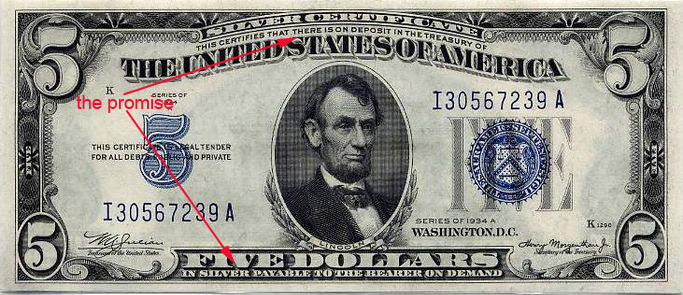
On a global scale, when someone in America bought something from a foreign country, they would pay in US dollars. The foreign company would then go to their local bank and exchange the dollars for their local currency. When foreign banks had a surplus of US dollars, they would then exchange them for gold. This meant that the US Treasury was always needing to acquire more gold to replenish its vaults and maintain the "gold backed" dollars in circulation.
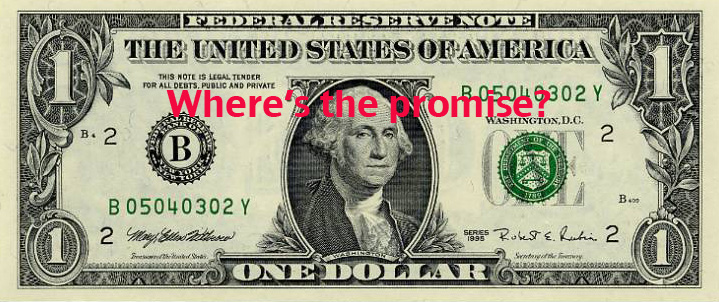 Prior to 1971 the dollars of the US were trusted all over the world. Each dollar was based on 1/35th ounce of gold, held in the US Treasury. The value of gold was fixed by law at 35 dollars = 1 ounce, so the value of each dollar was very stable. This made the dollar attractive as an international currency. But in 1971 this all changed. The Nixon Legacy -- fiat money
To do this he needed to change the law. So he did. The new system is called "fiat money" and is defined as follows: "Definition: Fiat money is money that is intrinsically useless; is used only as a medium of exchange." He ended the system of "promisary notes," ended the fixed value of gold and allowed the system of "supply and demand" to set the value of both gold and American currency. But wait! There's more! Enter Oil: Black Gold
The cap on 25% imported oil was lifted in exchange for the agreement that oil, purchased from any country in the world, would be bought only with American dollars. OPEC agreed and almost immediately there was a strong demand for dollars throughout the globe. This demand was not based on the value of gold but on the value that each dollar had in the marketplace. Since anyone who wanted oil had to have dollars, the dollar remained strong. Another thing that helped pull this scheme off was the fact that gold, held by the US Treasury, went from its fixed value of $35/ounce to its present value of over $600/ounce. Of course a cup of coffee was once 5¢ and now my Starbucks Latte-Macchiato-double-Skim is close to $5! Coffee, Automobiles and Computers: The Plot Thickens Oil is a big import but not the biggest. Americans buy so many things from foreign countries that it is staggering to imagine. In 1973 the US sold more goods to foreign countries than it bought. But in each successive year the tables have turned.
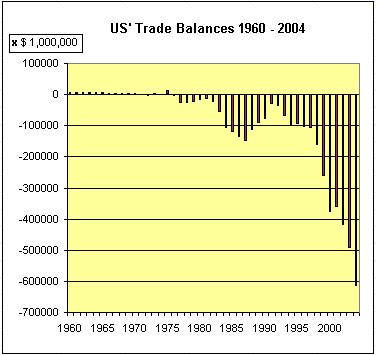
All of these goods are bought with "fiat dollars," meaning that the currency itself is worthless since it can never be exchanged for gold or silver. Of course, a foreign country could exchange it for something else -- something that was produced by America, like... hmm... (anyway). As the chart above shows, American exports, although representing 1.25 million dollars every two seconds, are insignificant. Fiat dollars remain in circulation mainly because they are needed to buy oil. For this reason lots of countries keep huge supplies of dollars in their reserves. It has become a way of storing their national wealth. The fact that US dollars represent foreign national wealth adds to their value. Good Is Bad: Bad Is Good This kind of system turns traditional logic on its head. Like, a trade defecit is supposed to be a bad thing, right? Wrong. It's actually good for the dollar! Imagine what would happen if everyone started using their dollars to buy things from America. The US would be flooded with dollars which would cause inflation and, besides, we don't have enough goods and services to exchange for all those foreign US fiat dollars! In fact, America is technically, as of last year, bankrupt! And what about higher oil prices... bad? No way. That keeps those pesky foreign flat US dollars "out there" and in high demand. It's very good for the dollar. Globalization, Nafta and Free Trade? Yep, they're also good for the dollar since they perpetuate the demand for greenbacks.
If this is beginning to sound like a classic "pyramid scheme," you're starting to get the picture. But sooner or later, someone has to pay. Houston, we have a problem! Imagine what would happen if the oil producing countries in OPEC decided to sell oil in some other currency besides US dollars! What if they changed the system to use the Euro, the Franc or the Yen? What would happen if no one needed US dollars anymore? Hang on tight, it's already started. Medvedev Shows Off Sample Coin of New 'World Currency' at G-8 By Lyubov Pronina July 10 (Bloomberg) -- Russian President Dmitry Medvedev illustrated his call for a supranational currency to replace the dollar by pulling from his pocket a sample coin of a "united future world currency." "Here it is," Medvedev told reporters today in L'Aquila, Italy, after a summit of the Group of Eight nations. "You can see it and touch it." The coin, which bears the words "unity in diversity," was minted in Belgium and presented to the heads of G-8 delegations, Medvedev said. The question of a supranational currency "concerns everyone now, even the mints," Medvedev said. The test coin "means they're getting ready. I think it's a good sign that we understand how interdependent we are." Medvedev has repeatedly called for creating a mix of regional reserve currencies as part of the drive to address the global financial crisis, while questioning the U.S. dollar's future as a global reserve currency. Russia's proposals for the G-20 meeting in London in April included the creation of a supranational currency. Iraq On November 6, 2000, Saddam Hussein switched the oil currency from the US dollar to the Euro. Two years later the Euro was rising in value while the dollar was sinking so low that the International Monitary Fund warned of the dollar's imminent collapse. The solution: Iraq was invaded on the pretext of developing weapons of mass destruction, the oil fields were seized and the newly installed government returned to the US dollar standard on March 19, 2003. Other nations, who held large dollar reserves, joined the coalition and contributed troops to pull this off. Venezuela Hugo Chavez has recently announced plans to nationalize the country's oil industry. Although Venezuela is a major oil producer and a member of OPEC, they have sold their oil to Cuba and other regional countries without the use of dollars and often in a barter exchange for domestically produced products. In 2001, Venezuela's ambassador to Russia announced that Venezuela was considering switching to oil sales in the Euro. Within one year the American government was seeking a regime change and America has been accused by Chavez of attempting to assassinate him in a failed coup attempt backed by the CIA. Russia Since June 8, 2006, Russia's Putin has been selling its reserves of US dollars. This has been done slowly to diminish any dramatic effect on the global supply, but it represents a decision of Russia to divest itself of a dollar reserve. The world market has taken notice. China An unprecedented signal from senior Chinese leaders that the Asian economic giant might abandon the U.S. dollar sent shockwaves through the markets today as the Dow Jones Industrial Average lost 360 points and the greenback fell to a record low against the euro. November 19,2007: Xu Jian, a Chinese central bank vice director, told a conference in Beijing, "The dollar is "losing its status as the world currency." Meanwhile, at the same meeting, Cheng Siwei, vice chairman of China's National People's Congress, said, "We will favor stronger currencies over weaker ones, and will readjust accordingly." Craig R. Smith, CEO of Swiss America Trading Corp., told WND he's been in the investment business for 30 years and has "never seen people more nervous." Alarmed by today's economic news, he dispatched a note to brokers with a warning of ominous potential consequences if China and other trading partners abandon the dollar. "If that were to happen, all bets are off, and we will be in a depression that makes 1929 look like child's play," he said, "or we will experience Weimar Republic inflation as the dollar makes extreme moves toward devaluations." Russia Dumps US Dollar As Basic Reserve Currency 5-21-9 (Pravda) -- The US dollar is not Russia's basic reserve currency anymore. The euro-based share of reserve assets of Russia's Central Bank increased to the level of 47.5 percent as of January 1, 2009 and exceeded the investments in dollar assets, which made up 41.5 percent, The Vedomosti newspaper wrote. The dollar has thus lost the status of the basic reserve currency for the Russian Central Bank, the annual report, which the bank provided to the State Duma, said. In accordance with the report, about 47.5 percent of the currency assets of the Russian Central Bank were based on the euro, whereas the dollar-based assets made up 41.5 percent as of the beginning of the current year. The situation was totally different at the beginning of the previous year: 47 percent of investments were made in US dollars, while the euro investments were evaluated at 42 percent. The dollar share had increased to 49 percent and remained so as of October 1. The euro share made up 40 percent. The rest of investments were based on the British pound, the Japanese yen and the Swiss frank. The report also said that the reserve currency assets of the Russian Central Bank were cut by $56.6 billion. The losses mostly occurred at the end of the year, when the Central Bank was forced to conduct massive interventions to curb the run of traders who rushed to buy up foreign currencies. The currency assets of the Central Bank had grown to $537.6 billion by October 2008. Therefore, the index dropped by almost $133 billion within the recent three months. The majority of Russian companies, banks and most of the Russian population started to purchase enormous amounts of foreign currencies at the end of 2008. The dollar gained 16 percent and the euro 13.5 percent over the fourth quarter. The demand on the US dollar was extremely high, and the Central Bank was forced to spend a big part of its dollar assets, experts say. The change of the structure of the currency portfolio of the Bank of Russia has not affected the official peg of the dual currency basket, which includes $0.55 and 0.45 EUR. The investments of the Bank of Russia in state securities of foreign issuers have been considerably increased, the report said. About a third of Russia's international reserves are based on US Treasury bonds. Russia became one of the largest creditors of the US administration last year, the US Department of the Treasury said. Russia increased its investments in the debt securities of the US Treasury from $32.7 billion as of December 2007 to $116.4 billion as of December 2008. India
Dollar no longer welcome at Taj Mahal The Taj Mahal may have been built as a testament to love but some hard-headed business decisions are now holding sway at India's most famous monument. First among them is that the US dollar is no longer welcome. With parts of the American economy in turmoil and the dollar rapidly losing its long-held position as the currency of choice, Indian authorities have calculated they are losing considerable sums of money by allowing foreign tourists to pay using greenbacks. A statement by India's Ministry for Tourism and Culture said the government had decided to act "in view of the international practices and also to avoid any anomaly on account of falling exchange rates of the US dollar vis-a-vis the rupee and the consequent fall in revenues". Until the change, foreign tourists visiting the Taj Mahal in Agra, south-west of Delhi, could enter by paying a fixed $5 (£2.45) fee – a price that was set when the dollar was worth around R50. But with the dollar having fallen by 12 per cent this year against the rupee and the current exchange rate closer to R39 to the dollar, the government has now fixed the entry price for foreigners at R250 – more than $6. "These rates have been fixed in line with international practices," a ministry spokesman said. "It will avoid any anomaly on account of falling dollar-rupee exchange rates." The ruling will affect around 120 sites overseen by the Archaeological Society of India, of which 27 – including the Taj Mahal – are World Heritage sites. The new rates are expected to be introduced as soon as this week to avoid a loss of income as the value of the dollar continues to fall. Indonesia, Malaysia and Lybia Other oil producing countries have already stated that they will begin moving from the dollar to the Euro. Indonesia, Malaysia and Lybia have already started this transition. Other countries like China and Japan are also beginning to convert a portion of their reserves to the Euro. Iran The US buys no oil from Iran following the hostage crisis in the 1970s. But Iran is a major global oil producer and, therefore, a major player in the "fiat dollar" scheme. In 1999 Iran announced plans to sell its oil in Euros. It actually started doing this in the spring of 2003. Iran sells about a third of its oil to European countries, the remaining share is largely bought by China. Following the announcement by Iran, the country was called an "axis of evil" by Bush and is currently the target of threats over its development of nuclear energy. At this writing, the US Navy has a large fleet in the Persian Gulf with contingency plans for an attack. Undoubtedly the desired outcome is regime change and re-establishment of the fiat dollar scheme. UPDATE! World Iran stops accepting U.S. dollars for oil 16:34 | 08/ 12/ 2007 TEHRAN, December 8 (RIA Novosti) - Iran has stopped selling its oil for U.S. dollars, the Iranian ISNA news agency said on Saturday, citing the country's oil minister. "In line with a policy of selling crude oil in currencies other than the U.S. dollar, the sale of our country's oil in U.S. dollars has been completely eliminated," ISNA reported Oil Minister Gholamhossein Nozari as saying. He also said "the dollar is no longer a reliable currency." Iran is the world's fourth-largest crude oil producer. At a November summit of Organization of the Petroleum Exporting Countries heads of state, Iran proposed that oil sales be carried for a variety of currencies, excluding dollars, but was not supported by any other members except Venezuela. Iranian President Mahmoud Ahmadinejad had previously called the U.S. currency a "worthless piece of paper." 2007 has seen a significant fall in the value of the U.S dollar against other major world currencies. Tensions remain high between Iran and the U.S., which has accused the Islamic Republic of attempting to build a nuclear weapon, as well as providing insistence to insurgents in Iraq. The U.S. National Intelligence Estimate (NIE), published on Monday, stated that Tehran had put a stop to weapons production in 2003, although it was continuing to enrich uranium. The report contradicted a previous U.S. intelligence assessment in 2005 which said that Iran was actively pursuing a nuclear bomb. U.S. President George W. Bush remained hawkish, despite the report, saying on Tuesday that, "Iran was dangerous, Iran is dangerous and Iran will be dangerous if they have the know how to make a nuclear weapon." When asked if military action remained an option, the president answered, "The best diplomacy - effective diplomacy - is one in which all options are on the table." OPEC Oil leaders' private debate televised by mistake! [Sunday November 18, 2007] 'Kill the cable, kill the cable,' shouted the security guard as he burst through the double doors into the media room at the Intercontinental Hotel in Riyadh, followed by Saudi police. It was too late. A private meeting of Opec leaders, gathered this weekend in Riyadh for the cartel's third meeting in its 47-year history, had just been broadcast to the world's media for more than half an hour after a technician had mistakenly plugged the TV feed into the wrong socket. The facade of unity that the cartel so carefully cultivates to a world spooked by soaring oil prices was shattered. Sometimes, such innocent mistakes can have far-reaching economic and political consequences. Commodity and currency traders said this weekend that oil prices would surge again tomorrow - possibly breaking the $101 per barrel record set in the late 1970s - while the already battered dollar would fall further on the back of the unintentional broadcast. On Friday night, during what the participants thought were private talks, Venezuela's oil minister Venezuela Rafael Ramirez and his Iranian counterpart Gholamhossein Nozari, argued that pricing - and selling - oil using the crippled dollar was damaging the cartel. They said Opec should formally express its concern about the weakness of the dollar when the cartel makes its official declaration at the close of the summit today. But the Saudis, the world's largest oil producers and de facto head of Opec, vetoed the proposal. Saud al-Faisal, the Saudi foreign minister, warned that even the mere mention to journalists of the fact that leaders were discussing the weak dollar would cause the US currency to plummet. Unfortunately his words and those of everyone at the meeting were being broadcast via a live television feed to a group of astonished reporters. 'I couldn't believe it,' said one who was there. 'When I realised they didn't know they were being broadcast live, I frantically started taking notes.' Opec only realised that the leaders' row was being broadcast to the world when the Reuters news agency put out a report of the argument. The weakness of the dollar is one reason why oil prices are so high, as cartel members seek to compensate for their lower earnings. This means a further drop in the dollar is likely to be accompanied by a rise in oil prices. Afghanistan Afghanistan does not produce oil; however they are strategically located in an area where a proposed pipeline from the oil rich regions in the Caspian Sea would deliver the oil to the Indian Ocean. In his previous article, Rudo de Ruijter outlined how resistance to this plan triggered the American war with Afghanistan. What Does It All Mean? I used to believe that politicians and big business were evil. They always seemed to act without regard for the common people. It's always the innocent families and civilians that are left homeless, killed or maimed because of some decision made behind closed doors. I used to think it was the elite, super-rich who were protecting their wealth and greed for oil money at our expense. I blamed them for everything from wars to preventing the development of free energy. While I still believe this is true, I now see the big picture and it frightens me. Oil and dollars have become the blood of our present civilization. A collapse of this fiat dollar system will not only destroy America's economy and lifestyle but it will have devastating impact throughout the entire planet. Since virtually all wealth is based on this dollar-for-oil scheme, a collapse of the system will send the entire world into an economic depression. This is what the politicians and decision makers are trying to avert. But the collapse is predictable and inevitable. I cannot help but wonder what kind of world awaits us on the other side. What would a dollarless and oil free civilization be like? What if we had endless supplies of free energy and no need for wars or money? At 56 years old, I may not get there with you. But, I have a dream. For more information on this topic, see " Cost, abuse and danger of the dollar." Forecast: U.S. dollar could plunge 90% Published: Nov. 19, 2007 at 2:16 PM RHINEBECK, N.Y., Nov. 19 (UPI) -- A financial crisis will likely send the U.S. dollar into a free fall of as much as 90 percent and gold soaring to $2,000 an ounce, a trends researcher said. "We are going to see economic times the likes of which no living person has seen," Trends Research Institute Director Gerald Celente said, forecasting a "Panic of 2008." "The bigger they are, the harder they'll fall," he said in an interview with New York's Hudson Valley Business Journal. Celente -- who forecast the subprime mortgage financial crisis and the dollar's decline a year ago and gold's current rise in May -- told the newspaper the subprime mortgage meltdown was just the first "small, high-risk segment of the market" to collapse. Derivative dealers, hedge funds, buyout firms and other market players will also unravel, he said. Massive corporate losses, such as those recently posted by Citigroup Inc. and General Motors Corp., will also be fairly common "for some time to come," he said. He said he would not "be surprised if giants tumble to their deaths," Celente said. The Panic of 2008 will lead to a lower U.S. standard of living, he said. A result will be a drop in holiday spending a year from now, followed by a permanent end of the "retail holiday frenzy" that has driven the U.S. economy since the 1940s, he said.
UPDATE:Fri, 16 Mar 2007 12:04:56 Iran says to sell oil in 'every currency' Iran's Oil Minister Kazem Vaziri Hamaneh has said that the Islamic Republic will sell its oil in all currencies. "Our oil sales will be in every currency," Dow Jones reported Hamaneh as saying on the sidelines of an OPEC meeting in Vienna on Thursday. Iran has already said it will carry out all its oil-industry related equipment purchases in euros instead of dollars and previously said it has informed its oil buyers that they should pay Iran in euros for the crude oil they purchase. "We need oil currencies," Vaziri said. 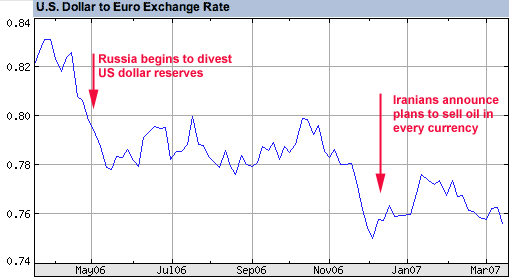 Note the effect on the dollar's decline as compared to the Euro. The actual start of this new policy is April but fear is aleady having an effect. Earlier on Wednesday, the media reported that Iran has started talks with a Japanese refiner to receive the payments in euro or yens instead of U.S. Dollars. This appears to be a new tactic to dodge recent U.S. economic pressures against the Islamic Republic as Washington has been pressing overseas banks to stop dollar transactions with Iranian banks. Japan is a major importer of Iranian crude and reportedly buys 486,000 barrels of oil per day out of Iran's production of about 3.8 million bpd.
Comments: Hello, Dan Eden's article on Money was well done. I have been a hard money believer for many years...the proven store of value from antiquity has been and is silver & gold. I used to ask uninformed souls what was the difference between a $5.00 bill and a $50.00 bill. They usually thought a while shrugged their shoulders. I would then inform them the only difference was the arrangement of the ink on the paper. The government tells us openly that our currency is a con-game. The spokesmen for the Treasurey will state that currencey value is based on "the good faith and confidence" in it's value by the public. Nothing else! I have collected the coins of ancient Rome for almost 20 years. One can trace the decline in the silver content of the Denarii with the decline of their empire. We are repeating the mistakes they made in debasing their coins and slipped into decline and ruin. I fear it will happen much faster with us. Hopefully people will prepare for the eventual collapse which seem inevitable at this point in time.
Sincerely, Freaked out average citizens might consider the fact that smart USD capital flight is already occurring, regardless of what they say on the evening news. For example, have you seen the article about how Dick Cheney is investing his nest-egg? He is betting on the collapse of the dollar. There are even some on the fringe who believe that the PTB intend to cause a collapse on purpose, so that they can unveil the Amero and the North American Union. If a citizen is lucky enough to have any USD to try and preserve, they might consider buying gold. But then again, gold might not be a very safe short-term solution for various reasons. One reason is that the government could step in and confiscate it again. Another reason is that certain reserve banks of the world have been coordinating sell-offs of their gold reserves to suppress the price and prop up the dollar. I believe they will lose control of this eventually, but we cannot know how long they can keep it down. There is a Euro ETF which might be a good place to park a few bucks. Another interesting 'basket-o-currencies' fund I am researching is the Merck (MERKX) hard currency fund. But again, maybe there is no safe haven. Unfortunately we cannot know how far the PTB will go to keep their stranglehold on world economies. If and when the systems collapse, money may be the least of our worries. SW San Jose, CA Wow. I'm kind of freaked out by this. And the fact that the politicians go out of their way NOT to talk about it is frightening. I wonder if the recent "bad day" on the stock market that was attributed to China had anything to do with this stuff? Keith, Tuscon, AZ Yeah. I'm thinking about buying gold because it seems to go up when the dollar goes down. But I heard a story from a friend who works in a bank about how there is some kind of law that says you cannot keep gold in a safe deposit box... or maybe it was that if you did, the bank doesn't have to gove it back to you because of some executive order that Bush signed. Anyway, the bottom line is that this friend said you's have to keep the gold out of the banks because soon they won't let it be in circulation. Anyone know what he's talking about? Keith Bloking Dear Keith, Your friend is absolutely correct. Do NOT put any sort of gold or silver items into the safe deposit box because the bank is under the orders from Dept of Homeland Security to not release those in case of economic meltdown. see http://bellaciao.org/en/article.php3?id_article=10012 or check with your bank branch manager... Sorry, Ed. Hey Ed, Wow. Thanks for the info! It's true! I read the link and then checked some other sites. Guess it's just a matter of time. Thanks. Keith So for us working stiffs that would prefer not to be marched like sheep to the slaughter, do you have a suggestion or plan to ride it out? Should I plan to cash all my dollars for Euros and just take a hit before the dollar is worthless? Should I apply for dual citizenship and try to become Swiss? What to do? As a responsible American veteran, what you say here makes me sick! Mostly because it is probably true. How can I make a difference? How can all concerned, FREAKED OUT, Americans make a difference? Yes I know don't freak! But beyond that. We need sound advice here. Thanks, John Edmonds Reply to Edmonds: First, everyone and his brother needs to know about this. The only way they made this happen was to keep it secret. Democracy only works if the people voting have the information and ask the right questions and take the right action.Everyone must know first. Peter Braughan Our end is reluctantly near Why I think we will go under, and I live here in the U.S.A., is we practice the wrong government. What? I pledge allegiance to the flag of (America?) the United States of America, and to the (Democracy?) Republic for which it stands. Republic? When we believe in a democracy, we opt for all the freebies we can get. I love welfare, Grants, and etc. But I am a junkie slave to my desires and am taxed to death for my rewards of free stuff. I think we have proved that with GOD in the pledge of allegiance that we had a land were our children can play in the yard day and night and not have fear and more peace to ourselves, But, now we will see even more as time goes of our new World choice because we are so enlightened we almost put the gun to our head and pull the trigger in an attempt to relearn, Question everything, trust nothing because we have been cheated by the ravages of our default religion. I am a Christian and I hate religion. What? Anyone that has a personal relationship with GOD doesn't need to do the things attributed to murder strife, stress, unrest, unsafe, pressuring, hate and so on. Religion is a belief in rules without the reflective divine guidance and common sense. I want to drink, get drunk, get real messed up, but I don't want a headache or wonder how I got so cold in the shower sleeping there all night and my water bill is $40 dollars more this month and did I drive that car into the living room because it is not mine? ! ! ! Do the right thing in your life and you won't have to default to Murphy's Law. There is nothing perfect on earth - but if everyone looked after the other guy He or She would be looked after also. The point is GREED from all sources is putting us under and the other government in the U.S.A. is using our resources and us for their own ends. The next time you have a chance, tour the back of the dollar bill and ask yourself. What's up with a double seal of the U.S.A.? Where can I get more Dollars?
Richard Morgan Sir, Thank you for this frank, no holds barred discussion of the theft of America's wealth and freedoms. I worked in commercial finance, in Manhatten for 25 years,and never got over the dismay resulting in the arbitrary, ego-driven process called Credit Evaluation. Dun and Bradstreet provided all the tools, ratios and interpretations necessary for sound, effective credit decisions in their course in "Financial Statement Analysis". No sooner had credit analysts taken this very expensive, complex course, when its lessons and wisdom were promptly forgotten or ignored. Politics and ego were vastly more important Either they didn't like Jews, they didn't like Blacks, Arabs, Orientals, or they didn't like franchises, sub-contractors, 1b or 2b rated credits. So far, there hasn'tt been any credit concerns mentioned, but the decision has been made. The other aspect of ego-driven decisions is that the power of analysts consists of saying 'No' to an application. If an analyst 'signs off', and actually approves an application, then his reputation, and perhaps job, are at risk for the entire term of the contract. This convinces me of the 'consiracy' nature of this collapse. There were so many poor decisions made by so many analysts at so many institutions that they had to have been granted immunity from their actions and directed to commit these egregious errors in judgement. Moodys rating these garbage securities AAA. Goldman Sux and and J,P, Rockefeller selling then around them around the world as if gold, and then making $Billions by selling them short. These are the people we need to go after and crucify. Gratitude and Regards, Bruce Weikman
This all sums up to one thing and that is in the near future all my money will have blood on it. Alecia Shear |

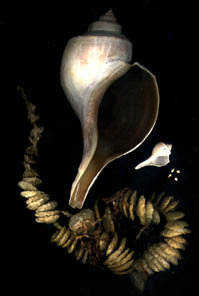 At the dawn of civilization, the earliest way to get something that you needed was called barter. I give you a cow and you build me a hut to live in. But what if I want a tiny hut? Do I give you half a cow? Placing a standard value on goods and services was first achieved through the use of currency, or money. Almost every culture has money. Ancient cultures used everything from sea shells and beads to huge circular stones to buy and sell. Eventually, precious metals were used and more recently the standard currency has been based on gold.
At the dawn of civilization, the earliest way to get something that you needed was called barter. I give you a cow and you build me a hut to live in. But what if I want a tiny hut? Do I give you half a cow? Placing a standard value on goods and services was first achieved through the use of currency, or money. Almost every culture has money. Ancient cultures used everything from sea shells and beads to huge circular stones to buy and sell. Eventually, precious metals were used and more recently the standard currency has been based on gold.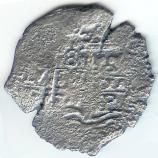 The original idea behind paper money was convenience. Each piece of paper represented a specific weight of a precious metal, usually silver or gold, that was kept somewhere in a treasury. If an individual wanted to, he could exchange the paper money for the gold or silver that it represented. It was all based on trust and a promise. In fact, the early paper money in America was called a "promisary note."
The original idea behind paper money was convenience. Each piece of paper represented a specific weight of a precious metal, usually silver or gold, that was kept somewhere in a treasury. If an individual wanted to, he could exchange the paper money for the gold or silver that it represented. It was all based on trust and a promise. In fact, the early paper money in America was called a "promisary note."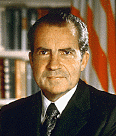 The Vietnam War was a painful time for America. We're still paying for the sins of our past leaders -- quite literally. The war was so expensive (estimated at $500 Billion) that America didn't have sufficient dollars in print to pay the bills for the disaster (The gold reserve only had about 30 Billion). But Nixon had a plan. Why not just print more dollars? Never mind that there isn't enough gold on reserve to back each note. Just print as much as you
The Vietnam War was a painful time for America. We're still paying for the sins of our past leaders -- quite literally. The war was so expensive (estimated at $500 Billion) that America didn't have sufficient dollars in print to pay the bills for the disaster (The gold reserve only had about 30 Billion). But Nixon had a plan. Why not just print more dollars? Never mind that there isn't enough gold on reserve to back each note. Just print as much as you 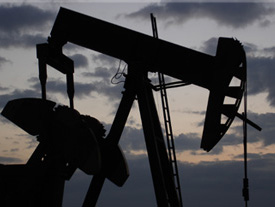 Back in the early 1970's, America produced most of the oil it needed. Texas oil fields were active and a far cry from the rusted rigs you can still see there today. We imported a fixed amount, about 25%, from foreign countries, but our thirst for oil was getting stronger. Nixon knew that America and every developing nation in the world would need more oil in the future. He also knew that OPEC, the handful of countries that produced foreign oil, wanted the limits of American imports lifted so they could sell more. So he cut a deal.
Back in the early 1970's, America produced most of the oil it needed. Texas oil fields were active and a far cry from the rusted rigs you can still see there today. We imported a fixed amount, about 25%, from foreign countries, but our thirst for oil was getting stronger. Nixon knew that America and every developing nation in the world would need more oil in the future. He also knew that OPEC, the handful of countries that produced foreign oil, wanted the limits of American imports lifted so they could sell more. So he cut a deal.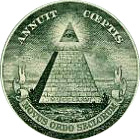 The whole system is kept running smoothly by global central banks who monitor the supply and demand for dollars on a daily -- even hourly -- basis. If there are too many dollars "out there" in the world, the US buys its own currency to create a scarcity. If there are too few, it sells more dollars or buys more foreign goods to replenish the supply.
The whole system is kept running smoothly by global central banks who monitor the supply and demand for dollars on a daily -- even hourly -- basis. If there are too many dollars "out there" in the world, the US buys its own currency to create a scarcity. If there are too few, it sells more dollars or buys more foreign goods to replenish the supply.